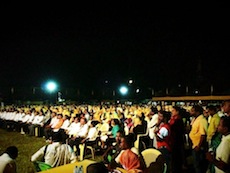A coalition government with cabinet posts divided among parties is not compatible with the presidential system envisioned in the Maldivian constitution, former President Mohamed Nasheed reiterated during campaign rallies at Fuvahmulah and Addu City this weekend.
Addressing large crowds in the two southernmost atolls, the Maldivian Democratic Party (MDP) presidential candidate accused mogul politicians of forming political parties only to offer its members “on a platter” to negotiate coalition agreements.
“[They say] my party will enter a coalition with your party if I can get this many seats in cabinet, that many judges, as well as a large warehouse and two resorts,” Nasheed said in Fuvahmulah on Thursday night (April 25), adding that “business” deals were made between leaders while party members remained “oblivious.”
Nasheed had previously characterised the cabinet of President Dr Mohamed Waheed as less of a team committed to shared goals than a group of individuals with divided loyalties and disparate ideologies often working at cross-purposes.
Both the Maldives’ own experience of ruling coalitions as well as lessons from “human experience” have established the conditions whereby such alliances could govern effectively without becoming unstable, Nasheed observed.
“In a presidential system, dividing the cabinet into four or five parts is not something we could do under any circumstances, [and] it is not something permitted by the Maldivian constitution either,” Nasheed said in Fuvahmulah.
According to the constitution, Nasheed continued, cabinet ministers are appointed by the president and are sworn to serve at his pleasure.
The constitution does not permit cabinet ministers to take orders from their parties instead of the president, Nasheed added.
Coalition governments therefore went against “the spirit of the constitution,” said Nasheed, and could not function under a presidential system.
Nasheed repeated the criticism of power sharing coalitions in his speech the following night (April 26) in Hithadhoo, Addy City.
The incentive for the proposed “broad coalition” to compete against the MDP was the hoped-for rewards of government posts and the country’s resources, such as uninhabited islands, to be divided among coalition partners, Nasheed contended.
Power sharing agreement
Nasheed’s remarks came while parties in the ruling coalition led by President Dr Mohamed Waheed are reportedly engaged in discussions over power sharing agreements.
However, in addition to President Waheed’s Gaumee Ihthihad Party (GIP), all major government-aligned parties have fielded presidential candidates, including MP Abdulla Yameen from the Progressive Party of Maldives (PPM), MP Gasim Ibrahim from the Jumhooree Party (JP) and MP Ahmed Thasmeen Ali from the Dhivehi Rayyithunge Party (DRP).
Smaller parties such as the religious conservative Adhaalath Party and the Dhivehi Qaumee Party (DQP) – led by Special Adviser to the President Dr Hassan Saeed – have entered into a coalition with Dr Waheed’s GIP.
While business magnate Gasim Ibrahim is reportedly in talks with Dr Waheed over a potential power sharing agreement, the JP presidential candidate has said he would not consider becoming the running mate of any other candidate.
At its recently-concluded fourth congress, DRP Leader Thasmeen meanwhile dismissed the possibility of a coalition with either the PPM or MDP.
The PPM was formed in 2011 by DRP founder, former President Maumoon Abdul Gayoom, following months of factional squabbling and an acrimonious war of words between the PPM figurehead and his successor at DRP.

PPM MP Ahmed Nihan told Minivan News last week that parties in the ruling coalition needed to reassess their views on power sharing after thousands of people attended a MDP rally on April 19 to celebrate the signing of Speaker of Parliament Abdulla Shahid.
In his speech at the MDP rally in Addu City last night (April 26), Shahid meanwhile said that 1,300 people have signed for the party during the past week.
Speaking at his first MDP rally on April 19, Shahid pledged to carry out a recruitment drive across the country to bolster the party’s membership strength ahead of the September presidential election.